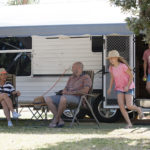The inaugural RV Consumer Report 2018 is the most comprehensive consumer study of its kind in Australia to examine recreational vehicle purchasing and usage preferences among current vehicle owners, former owners, potential new market entrants and consumers who have limited preference for buying into the RV lifestyle.
Of the respondents surveyed, the average age of an RV owner was 33 and has an average income of $48, 000-$72, 000.
The research shows that more people than ever in Australia own a Recreational Vehicle (RV), with 1 in 13 households in Australia having an RV registered. The research highlights several key trends including the vital role that family structure and change has on RV ownership, the positive influence that childhood camping experiences have on future purchase intention, the increased preference of outdoor activities for RV owners, and the role that economic pressures has on buying into, or selling out of RV ownership.
One of the most significant factors for consumers was the importance of children, with 42% of current RV owners having children under 15 living at home.
Many people also waited to start a family or for their children to reach a certain age before purchasing an RV, which is also linked with retirement. Consumers also indicated they were more likely to purchase an RV if they camped as a child, with 67% of current RV owners camping in their childhood.
The research also indicated the typical RV owner is more active and enjoys an outdoor lifestyle; 87% of current RV owners indicated a preference for outdoor activities such as hiking and fishing.
A core aspect of the research was identifying the elements of RVs that prospective buyers looked for, with a clear trend towards functionality over aesthetics. Nearly half (40%) of RV owners said that road handling was the most important aspect of a purchase, with only 1 in 7 willing to economise this feature for a lower purchase price.
However, price was also rated a vital element of an RV purchase, with 80% of consumer stating this was the most influential factor. The modern RV consumer’s path to purchase appears to be significantly changing, with 47% of new market entrants indicating they consider hiring an RV in Australia to ‘try before the buy’, with this being driven by the under 40s.
Most RV owners (80%) were also likely to travel to new places without planning in advance, resulting in more confidence in exploring regional destinations. This demonstrates the value the RV industry has to regional tourism bodies.
As this is the first year of the reporting series, this study sets the benchmarks to examine the Australian population over the coming decades to understand shifts in consumer preferences, lifestyle choices, buying and selling trends, purchase intention, RV features and amenities preferences, rental and peer-to-peer usage, and travel and leisure patterns.


